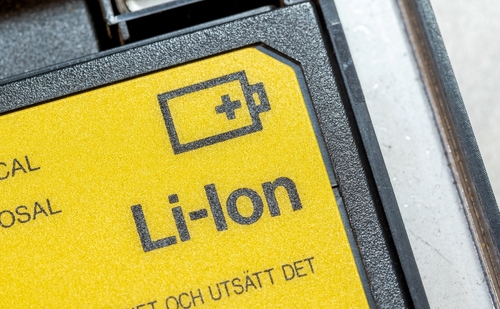In this post we will discuss the key differences between lithium and alkaline batteries, along with some of the risks associated with each type of battery. We will also explore some precautions you can take to keep your home, or your business, safe from the risks of battery fires.
If you’re concerned about the risks of lithium battery fires, we can help you ensure you have all the cover you need at the best price. For more information, contact us on 020 8290 9080 or email business@anthonyjones.com.
What Are Lithium Batteries?
Lithium-ion batteries power many modern devices. They are lightweight with a high energy density, and they are rechargeable.
They are called “lithium-ion batteries” because of the way they operate – lithium ions move from the anode to the cathode when they are discharging electricity, then back again when you charge the battery.
What Are Lithium Batteries Used For?
Lithium batteries are often used in e-bikes, e-scooters, smartphones, tablets, and vapes.
What Are Alkaline Batteries?
Alkaline batteries are the small, disposable batteries used in low-power electronic devices. They are available in a range of sizes, including AA, AAA, C, D, and 9V.
Alkaline batteries provide power through a chemical reaction involving zinc and manganese dioxide. They are durable with a long shelf life, making them ideal for powering devices that need constant power for a long-term period.
What are Alkaline Batteries Used For?
Alkaline batteries can be found in small devices like TV remotes, torches, toys, and smoke detectors.
So What Are The Key Differences Between Lithium Batteries and Alkaline Batteries?
- Operation – As the names suggest, lithium batteries work through moving lithium ions from one electrode to another, whereas alkaline batteries rely on a chemical reaction involving zinc and manganese dioxide.
- Rechargeable vs. Disposable – Lithium batteries are rechargeable. Alkaline batteries must be disposed of once they are depleted.
- Weight – Lithium batteries are a lot more lightweight than alkaline batteries.
- Application – Alkaline batteries are perfect for low voltage devices, whereas lithium batteries are better suited for high-drain devices such as laptops, tablets, smartphones, e-bikes, and e-scooters.
- Affordability – Alkaline batteries generally cost less upfront than lithium batteries. However, as they are rechargeable, lithium batteries may prove more affordable in the long-term.
Fire Risk: Alkaline vs. Lithium Batteries
All batteries carry a certain fire risk. The risk of fire can be much higher for lithium batteries than it can for alkaline batteries.
Because alkaline batteries have a relatively low capacity, and because they are used to power low-voltage devices, the risk of fire is low. The risk only really arises if they are crushed, damaged, or exposed to extreme temperatures.
Lithium batteries, though, carry a strong fire risk. When they are fully charged, lithium batteries store a lot of energy. If they are in any way damaged or compromised, a lot of heat and pressure can build up inside the battery. This can result in a chemical reaction known as a thermal runaway.
In a thermal runaway, the lithium battery rapidly overheats, and can even spontaneously ignite. When a lithium battery catches fire, it can burn at 1,000°C while emitting toxic, flammable gases. If these gases ignite, it can result in an explosion.
One of the major safety concerns with lithium-ion batteries is that, in rare cases, they can ignite even when they are not in use.
How To Prevent Battery Fires
- Take care when storing and disposing of any batteries of any type. Do not store them anywhere they might be exposed to particularly high or low temperatures. When disposing of batteries, never use your standard bins. Instead, use dedicated battery disposal and recycling services.
- Only use the batteries in accordance with the manufacturer’s instructions. For alkaline batteries, this means you should only ever use the battery size and voltage that the device requires. For lithium batteries, it means you should never overcharge, and you should never expose the battery to excessive temperatures.
- Stop using your batteries immediately if they appear in any way scuffed or damaged. Also pay attention to how they function. For example, if a lithium battery drains faster than usual, or if it takes longer to charge, it could indicate that it’s damaged.
- Only buy batteries from reputable manufacturers and trusted retailers. This way you can ensure that all the batteries you use have passed all necessary safety standard tests.
Read our full guide to preventing battery fires.
Are You Covered For Lithium Battery Fires?
If you’re concerned about the risks of lithium battery fires, we can help you ensure you have all the cover you need at the best price. For more information, contact us on 020 8290 9080 or email business@anthonyjones.com.


